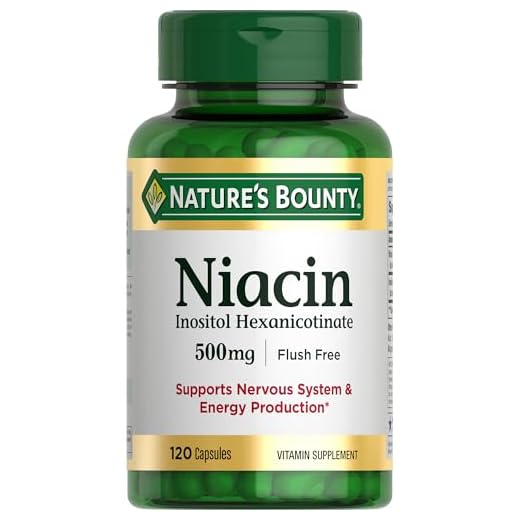







Vitamin B3, known as niacin, can potentially benefit heart health by managing cholesterol levels. It lowers LDL cholesterol and raises HDL cholesterol, which can be helpful. However, recent research shows that excessive niacin intake may actually increase the risk of heart disease due to harmful inflammatory byproducts, such as 4PY. These byproducts are linked to a heightened risk of heart attack and stroke. For ideal heart health, it's essential to obtain niacin primarily from food sources and to monitor your intake. If you're interested in exploring this topic further, there's a lot more to uncover about niacin and heart health.
Key Takeaways
- Vitamin B3 (niacin) can lower LDL cholesterol and raise HDL cholesterol, potentially benefiting heart health.
- Excessive niacin intake may increase cardiovascular risks due to inflammatory metabolites like 4PY.
- High levels of niacin are linked to a 1.6 to 2 times greater risk of heart attack and stroke.
- Dietary sources of niacin are preferred over supplements to avoid excessive intake and related health risks.
- Consultation with healthcare providers is essential for safe niacin supplementation and monitoring cardiovascular health.
Overview of Vitamin B3
Vitamin B3, commonly known as niacin, plays an essential role in your body's energy production and overall health. It's important for converting food into energy and maintaining healthy skin and a functioning nervous system. Since your body can't synthesize niacin, you must obtain it through dietary intake or supplementation. You can find Vitamin B3 in a variety of foods, including animal products, legumes, whole grains, and nuts. Many fortified foods also include niacin to help prevent deficiencies. Additionally, Source Naturals Niacin provides a high-quality option for those seeking to enhance their Vitamin B3 intake through supplementation.
Historically, niacin has been recommended for cholesterol management, but recent studies raise concerns about excessive intake. Some research indicates that too much niacin could increase the risk of heart attacks and strokes due to inflammatory byproducts like 4PY. Approximately one in four individuals studied showed excessive niacin levels linked to elevated 4PY, which is associated with vascular inflammation and atherosclerosis.
The Cleveland Clinic study highlights the need for caution regarding niacin supplementation, as excess amounts may negate its potential heart health benefits. Understanding these dynamics is significant when considering niacin as a modifiable risk factor for cardiovascular disease.
The Role of Niacin in Heart Health
Niacin plays a complex role in heart health that merits careful consideration. Historically, you might've known niacin, or vitamin B3, as a supplement for managing cholesterol levels. While it can effectively lower LDL cholesterol and raise HDL cholesterol, recent research raises concerns about its safety, particularly regarding cardiovascular risk. A high-quality niacin supplement, such as minimal to no-flush formula, can help alleviate some discomfort often associated with traditional niacin. Excessive niacin intake can lead to elevated levels of inflammatory metabolites, particularly 4PY, which have been linked to a 1.6 to 2 times increased risk of major cardiac events like heart attacks and strokes.
The inflammation caused by these metabolites may contribute to atherosclerosis, where plaque builds up in your arteries, potentially compromising heart health. Alarmingly, studies suggest that one in four individuals may have excessive niacin levels, underscoring the importance of using niacin supplementation under medical supervision.
Although niacin has its benefits in cholesterol management, recent findings highlight that excessive intake could negate those cardiovascular advantages while introducing new health risks. Hence, it's essential to approach niacin with caution, ensuring that any supplementation aligns with your overall heart health strategy.
Recent Research Findings
Recent studies have sparked significant concern about the safety of niacin supplementation in relation to heart health. A recent study published in *Nature Medicine* revealed that high levels of niacin (vitamin B3) are associated with an increased risk of heart attacks and strokes, challenging the notion that niacin is protective against cardiovascular disease risk. Researchers identified a breakdown product of excess niacin, known as 4PY, as a key predictor of future cardiovascular events. Their analysis of blood plasma from over 1,100 individuals showed that those in the top 25% of 4PY levels had a 1.6 to 2 times greater risk of major cardiac events. While vitamin B3 is known for its potential improves heart health, these findings suggest that excess niacin may counteract the cholesterol-lowering effects typically associated with its use, leading to a paradox where niacin supplementation does not necessarily reduce heart disease risk. Consequently, there's a growing need to reevaluate dietary recommendations regarding niacin, as it may serve as a modifiable risk factor for cardiovascular disease. Overall, it's essential to approach niacin supplementation with caution and consider these emerging insights for your heart health.
Niacin's Impact on Cholesterol
Historically, vitamin B3 has been championed for its ability to manage cholesterol levels, particularly in lowering low-density lipoprotein (LDL) cholesterol. Niacin, often used in supplements, can indeed reduce LDL cholesterol, which is a vital factor in cardiovascular health. However, recent clinical trials reveal a paradox: while niacin improves cholesterol profiles, it doesn't markedly lower the risk of heart attacks or strokes.
This discrepancy raises concerns about the overall effectiveness of niacin for heart disease prevention. Notably, excessive niacin intake can lead to inflammatory byproducts like 4PY, which are associated with increased cardiovascular risks, including heart attacks and strokes.
Given these findings, it is important to approach niacin supplementation with caution. Current recommendations suggest consulting your healthcare provider before using niacin supplements, especially if you have concerns about heart health. The implications of excess niacin on inflammation and cardiovascular risk are increasingly evident, prompting a reevaluation of its role in managing cholesterol and preventing heart disease. Balancing the benefits and risks of niacin is vital for anyone considering it as part of their health regimen.
Risks of Excess Niacin
Excess niacin can pose significant health risks that may outweigh its cholesterol-lowering benefits. While niacin was once heralded for its ability to manage cholesterol, particularly in lowering LDL cholesterol levels, high niacin intake can lead to increased levels of 4PY. This metabolite is associated with a 1.6 to 2 times higher risk of heart attacks and strokes, particularly for those in the top 25% of 4PY levels.
Moreover, excess niacin has been linked to vascular inflammation, a key contributor to atherosclerosis and cardiovascular disease. This inflammation can negate the positive effects of niacin on cholesterol management. Recent studies indicate that one in four participants had excessive niacin levels, underscoring the potential health risks of high intake.
It's essential to evaluate these risks when assessing niacin as a supplement. The balance between achieving beneficial cholesterol levels and avoiding the dangers of excess niacin is delicate. Consulting with healthcare professionals about niacin intake can help you navigate these potential pitfalls and make informed decisions for your heart health.
Recommendations for Niacin Intake
Understanding the right amount of niacin intake is essential for maintaining heart health while minimizing risks associated with high levels. Current recommendations suggest that you should obtain niacin primarily from food sources like animal products, legumes, and whole grains, rather than relying on supplements. While niacin is vital for converting food into energy, excessive intake can lead to elevated levels of harmful byproducts that increase your risk of heart disease.
In fact, a recent study found that one in four individuals had elevated niacin levels, highlighting the importance of monitoring your dietary intake. High-dose niacin supplements should be avoided unless specifically directed by a healthcare provider, as they've been linked to a higher risk of heart attacks and strokes.
Moreover, ongoing research is prompting experts to reevaluate niacin fortification policies in food products, given the potential cardiovascular risks associated with excessive consumption. By focusing on natural food sources and being mindful of your intake, you can maintain a healthy balance of niacin while safeguarding your cardiovascular health. Remember, moderation is key to reaping the benefits without inviting unnecessary risks.
Future Research Directions
The complexities surrounding niacin's role in cardiovascular health necessitate further research to unravel its paradoxical effects. While niacin is known for its cholesterol-lowering benefits, ongoing studies must clarify its association with increased inflammatory metabolites like 4PY, which could exacerbate cardiovascular disease. Future studies should investigate the long-term impacts of excess niacin intake on heart health and its potential to heighten metabolic risks.
Additionally, exploring genetic factors influencing 4PY levels and their contribution to vascular inflammation could pave the way for personalized treatment strategies tailored to individual needs. This approach may enhance the effectiveness of interventions aimed at reducing cardiovascular risk.
Research should also evaluate the implications of current niacin fortification policies, especially in light of newly identified risks associated with high niacin levels. Understanding how niacin affects inflammatory pathways in cardiovascular disease is essential for developing effective prevention and treatment methods. By addressing these critical areas, future studies can provide a more thorough understanding of niacin's role in heart health, ultimately leading to improved strategies for managing cardiovascular disease.
Conclusion
In the quest for heart health, Vitamin B3 stands out like a beacon of hope. While niacin shows promise in lowering cholesterol and potentially reducing heart disease risk, it's crucial to tread carefully due to possible side effects from excessive intake. As research continues to unfold, you might find that a balanced approach to niacin, along with a healthy lifestyle, could be your best defense against heart disease. After all, every heart deserves a fighting chance.





